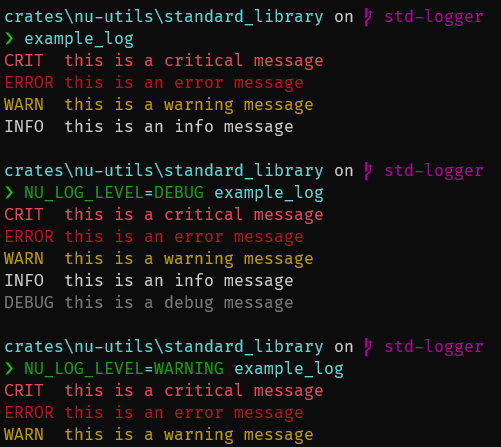mirror of
https://github.com/nushell/nushell.git
synced 2025-07-31 18:21:17 +02:00
# Description ```nushell log critical "this is a critical message" log error "this is an error message" log warning "this is a warning message" log info "this is an info message" log debug "this is a debug message" ```  # Tests + Formatting Tests are written. To run automatically, #8443 needs to be merged before or after this PR. --------- Co-authored-by: Mate Farkas <Mate.Farkas@oneidentity.com>
Welcome to the standard library of `nushell`!

The standard library is a pure-nushell collection of commands to allow anyone to build
complex applications using standardized tools gathered incrementally.
In this library, you might find rust-like assert commands to write tests, tools to
manipulate paths and strings, etc, etc, ...
🧰 use the standard library in the REPL or in scripts
in order to "import" the standard library to either the interactive REPL of
nushell or inside some .nu script, you might want to use the
use command!
use /path/to/standard_library/std.nu
🔍 a concrete example
- my name is @amtoine and i use the
ghqtool to managegitprojectsNote
ghqstores any repository inside$env.GHQ_ROOTunder<host>/<owner>/<repo>/
- the path to my local fork of
nushellis then defined aslet-env NUSHELL_REPO = ($env.GHQ_ROOT | path join "github.com" "amtoine" "nushell")
- and the full path to the standard library is defined as
let-env STD_LIB = ($env.NUSHELL_REPO | path join "crates" "nu-utils" "standard_library")see the content of
$env.STD_LIB😋>_ ls $env.STD_LIB | get name | str replace $env.STD_LIB "" | str trim -l -c "/" ╭───┬───────────╮ │ 0 │ README.md │ │ 1 │ std.nu │ │ 2 │ tests.nu │ ╰───┴───────────╯
- finally we can
usethe standard library and have access to the commands it exposes 👍>_ use std.nu >_ help std Module: std Exported commands: assert (std assert), assert eq (std assert eq), assert ne (std assert ne), match (std match) This module does not export environment.
✏️ contribute to the standard library
🔧 add new commands
- add new standard commands to
std.nu, or preferably create a new submodule. - add associated tests to
test_std.nuor preferably totest_<submodule>.nu.- define a new exported (!)
test_<feature>command - import the
assertfunctions you need at the top of the functions, e.g.use std.nu "assert eq"
- define a new exported (!)
🧪 run the tests
the following call should return no errors
NU_LOG_LEVEL=DEBUG nu /path/to/standard_library/tests.nu
🔍 a concrete example
with
STD_LIBdefined as in the example aboveNU_LOG_LEVEL=DEBUG nu ($env.STD_LIB | path join "tests.nu")